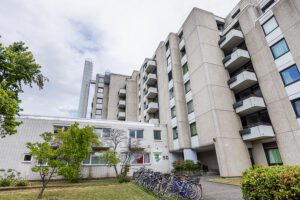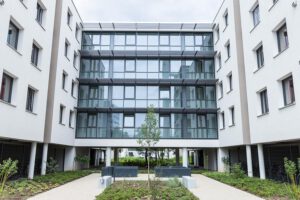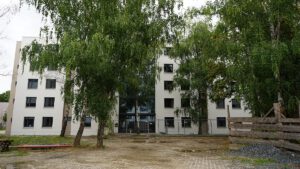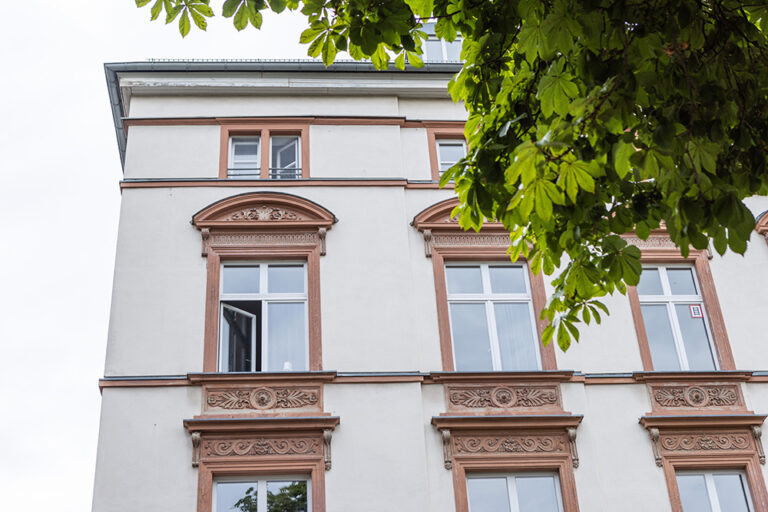
The "Bauverein"
Story
Bauverein was founded in 1954 by the then university pastor Ottmar Dessauer and members of the Catholic University Community (KHG) in Frankfurt. The Bauverein is an association registered with the district court in Frankfurt. Today's members of the association enjoyed student life themselves in one of the dormitories or in the KHG many years ago and are still connected to Bauverein after their studies. They work voluntarily for the goals of the association: the social, religious, scientific and cultural advancement of the students.
Under the motto "Study - Reside - Live", Bauverein wants to offer more than just a roof over your head.
In the combination of modern rooms at socially acceptable prices, the diverse commitment of our residents and a good and benevolent cooperation between students, administration, management and members of Bauverein, we are trying to be the "place to be" for student housing in Frankfurt in the 2020s years.
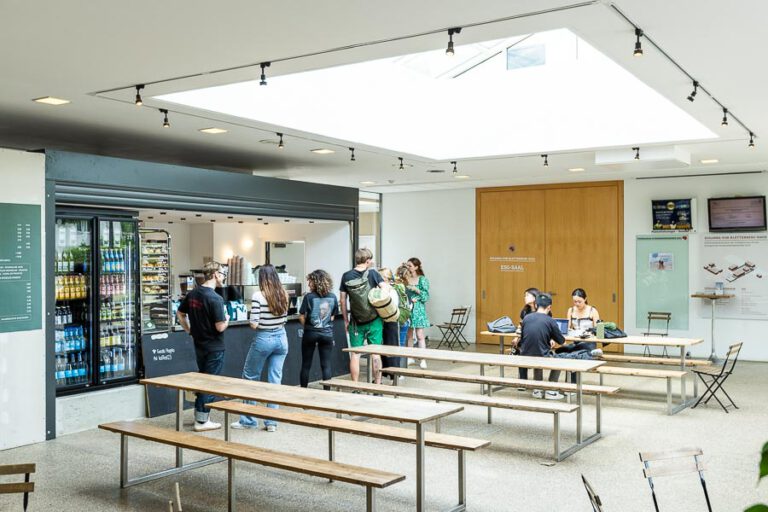
A total of around 850 students from over 80 nations are currently living together in shared apartments of different sizes.
Bauverein is the largest ecclesiastical sponsor of student residences in Frankfurt. Bauverein maintains:
- the Friedrich-Dessauer-Haus (FDH) in the district of Hausen with rooms for 616 students
- the Alfred-Delp-Haus (ADH) with 175 rooms on the Westend campus
- the Dernbach-Haus (DBH) with 25 rooms for doctoral students at Westendplatz
- the Bernhard- und Ludwig-Becker-Haus (BBH) with 56 rooms (on behalf of the General Association of Catholic Churches in Frankfurt am Main)
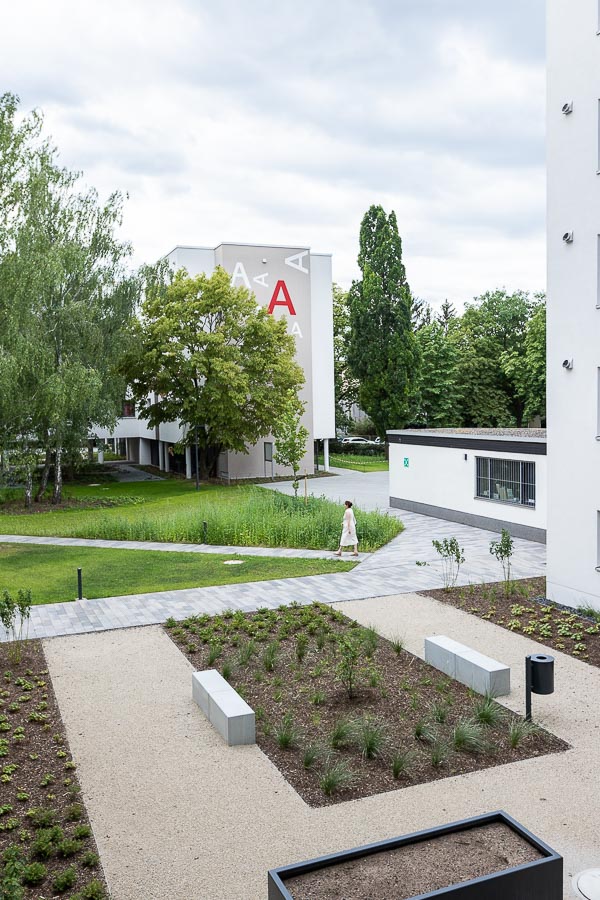
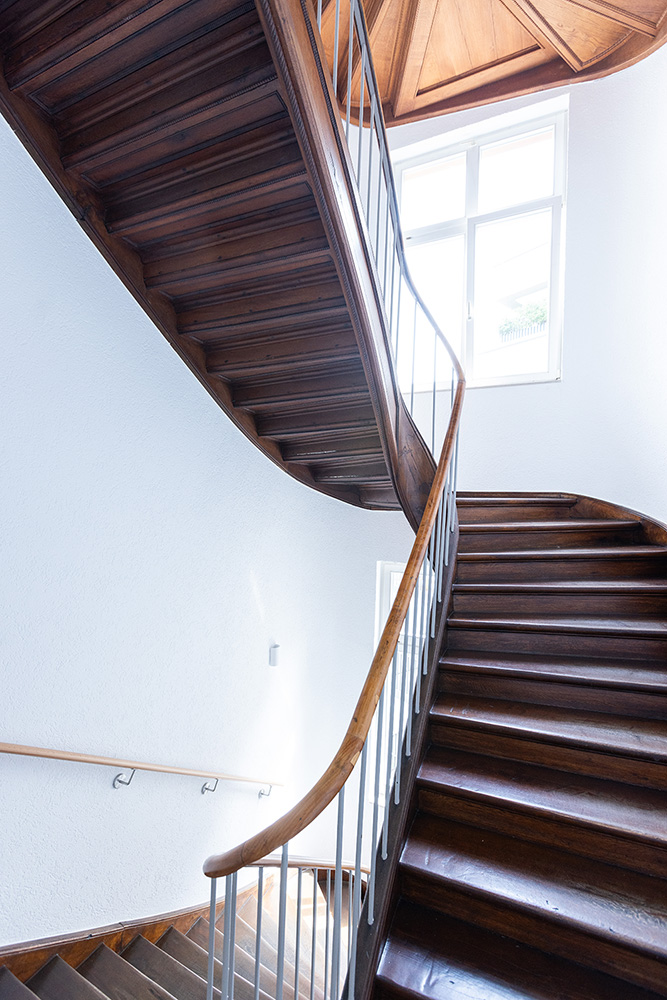
The board of the association works on a voluntary basis. A board member by office is the university pastor and the business of the association is managed by a full-time managing director.
Various committees of the association are: the general meeting, the board of trustees of Bauverein, the advisory board of Bauverein and the tenancy agreement commission. Commitment and co-determination, also on the part of the students, is very important to us and this is also reflected in the fact that representatives from the student representation (SV) participate equally in all committees (except for the general assembly).
Detailed areas of responsibility for the individual committees can be found in the articles of Bauverein, which we will be happy to provide on request.
Regarding the "catholic" at Bauverein
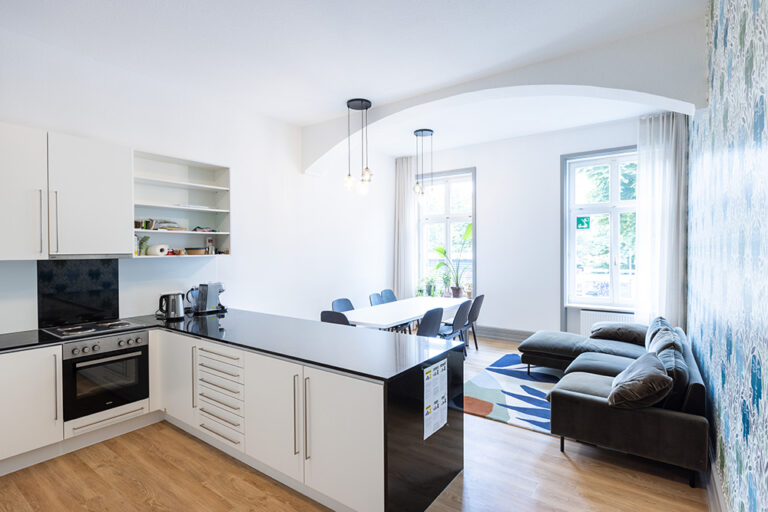
In the spirit of church koinonia (community), all shared flats are designed in such a way that residents have access to a shared kitchen that offers space for encounters and togetherness.
With this in mind, our shared flats are deliberately made up of a mix of women and men and are also mixed in terms of the cultural, religious or national background of the residents. The semester program of the dorm also offers space for exchange and encounters. The togetherness is promoted and supported by the offers of the student’s advisor and the student represantatives (SV). As a rule, our events and notices are bilingual in order to minimize language barriers as much as possible.
In the sense of church diakonia (service to the neighbor or those in need), social reasons and the respective study situation are the decisive criteria when allocating rooms.
Admission to the halls of residence is independent of gender, nationality or denomination. At the same time, our residents have access to offers such as coaching, conflict management and advice from the student’s advisor. In good and proven cooperation with the Catholic university community (KHG), we offer affected residents the social counseling of the KHG and, if necessary, refer to possible offers of financial help or mediate, for example, to offers of help for psychological counseling.
In the sense of the church Leiturgia (services), there is usually a spiritual impulse at the beginning of the semester in the halls of residence, which is offered to everyone.
This is designed in such a way that everyone can participate regardless of religious affiliation, which takes the diversity within the dorm into account. At the same time, there are repeated invitations to the services of the KHG and various points from the semester program of the KHG are gladly referred to and our residents are invited to participate.
Pressemitteilungen
Further information about the name patrons of the houses
Friedrich Dessauer:
Friedrich Dessauer – Wikipedia
Alfred Delp:
Dernbach:
There are several places called Dernbach. Our Dernbach house is so called because the blessed Maria Kasper lived in Dernbach in the Westerwald and founded a Catholic religious community. Today, this religious community is international and takes care of people who need their help. Among other things, it offers young people a kind of “second home”. The Dernbach house of Bauverein can also become a home for the time of the dissertation.
Maria Kasper:
Maria Katharina Kasper – Wikipedia
Bernhard und Ludwig Becker:
